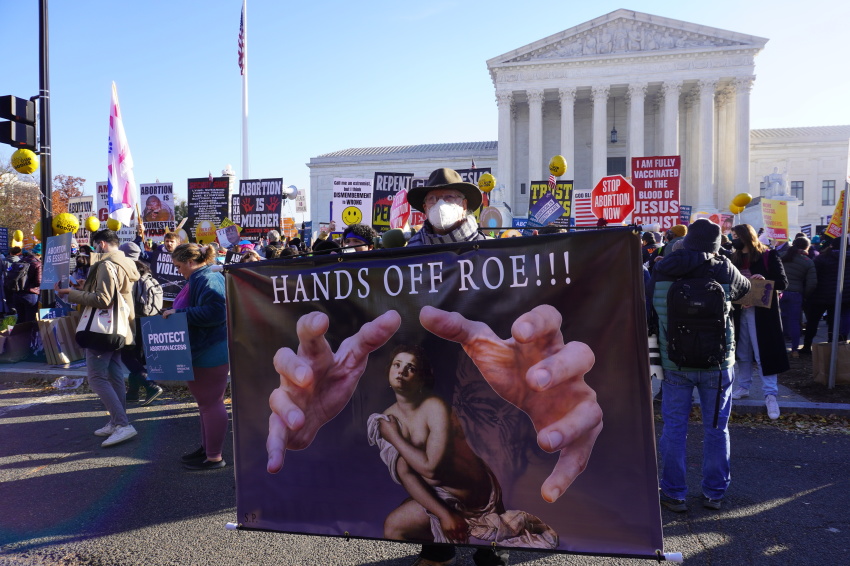The Christian Post's top 10 news stories of 2021 (part 1)

8. Pro-life legislation gains momentum at the state level
While abortion is always a hot topic in American politics, the contentious issue reached a new level of significance in 2021 as states passed a record number of pro-life laws and major abortion cases made their way to the U.S. Supreme Court.
In a report published at the end of April, the pro-abortion research organization Guttmacher Institute predicted that “2021 is on track to become the most devastating anti-abortion state legislative session in decades.” The institute tallied 61 abortion regulations that were implemented across 13 states and over 500 pro-life bills that had been introduced nationwide in the first four months of 2021.
Shortly before the report was published, Oklahoma’s Republican Gov. Kevin Stitt signed a series of pro-life bills into law, including a ban on abortions after a baby's heartbeat can be detected and laws that require abortion providers to be board-certified in gynecology and obstetrics as well as labeled abortion “unprofessional conduct.” The governors of Arizona and South Dakota signed bills that would ban abortions performed solely based on genetic abnormalities such as Down syndrome.
Arkansas Gov. Asa Hutchinson signed a law designed specifically to challenge Roe v. Wade, the 1973 U.S. Supreme Court decision that legalized abortion nationwide, by banning abortions in all cases except if the mother’s life is in danger. The law was put on hold in July by a federal judge shortly before it was set to take effect.
The Guttmacher Institute released a second report in early July, which determined that 2021 was “already the worst legislative year ever for U.S. abortion rights.” By the middle of the year, 90 regulations had been enacted at the state level, the most in any year since the 1973 Roe decision.
Additional pro-life laws passed in the time since the Guttmacher Institute’s mid-year report include a restriction on chemical abortions to the first seven weeks of pregnancy in Texas. South Dakota Gov. Kristi Noem signed an executive order banning telemedicine abortions and Louisiana’s Democratic Gov. John Bel Edwards signed a bill requiring abortionists to notify women about their option to reverse a chemical abortion.
The U.S. Supreme Court has weighed in on the abortion issue multiple times throughout the year.
On May 17, the high court announced that it would hear an appeal from the state of Mississippi, which is asking the justices to reverse a lower court decision striking down the state’s 15-week abortion ban.
Pro-life activists hailed the justices’ decision to hear the case of Dobbs v. JacksonWomen’s Health as a “landmark opportunity." Meanwhile, abortion activists have expressed concern over what the decision to hear the case could mean for abortion, considering that six of the court's nine justices were appointed by Republican presidents.
Activists predicted that scientific progress in the nearly half-century since the Roe v. Wade decision, namely the availability of “scientific facts on how a baby does feel pain in the womb at 15 weeks,” could persuade justices to chip away at the controversial Roe decision.
The Catholic Association presented four-dimensional ultrasound images in a brief submitted to the Supreme Court ahead of oral arguments in the Dobbs case, which the justices heardon Dec. 1.
Following the oral arguments, pro-life activists expressed optimism that a majority of justices would sympathize with their point of view based on the questions they asked during the arguments.
The Dobbs case is the first major abortion case to come before the Supreme Court since the late Justice Ruth Bader Ginsburg, beloved by liberals, was replaced by Justice Amy Coney Barrett. The current composition of the Supreme Court has caused Democrats concern.
Some Democrats have threatened that a decision in favor of Mississippi would “fuel” the push from progressives to add justices to the Supreme Court to dilute the effect of the nominally conservative majority, a process derided by critics as “court packing.”
While the law at issue in the Dobbs case was passed three years ago, a “heartbeat bill” passed in Texas received legal scrutiny even before it took effect in September. Lower courts, along with the Supreme Court, ultimately allowed Texas’ heartbeat bill, which bans abortions after a baby's heartbeat can be detected, usually at around six weeks gestation, to go into effect.
Texas Senate Bill 8 differs from most other pro-life legislation in that it leaves enforcement of the law up to individuals as opposed to government officials. Specifically, individuals have the power to take civil action against “anyone who performs and induces an abortion” or “knowingly engages in conduct that aids or abets the performance or inducement of an abortion, including paying for or reimbursing the costs of abortion through insurance or otherwise.”
After the Texas law went into effect, the Democrat-led U.S. House passed the Women’s Health Protection Act, which would codify Roe into federal law and limit the ability of states to pass abortion regulations. The Senate, where Democrats have a narrow 50-50 majority with Vice President Kamala Harris casting the tie-breaking vote, has yet to act on the legislation.
The U.S. Department of Justice filed a lawsuit against Texas a week after S.B. 8 took effect. While a federal judge granted the Justice Department’s request to put enforcement of the law on hold, the 5th U.S. Circuit Court of Appeals temporarily reinstated it two days later.
The Supreme Court heard oral arguments in a legal challenge to the law on Nov. 1 and most recently, issued a decision allowing the law to remain in effect as litigation continues.
While state laws have consumed most of the abortion debate in 2021, the pro-life movement has achieved several victories at the local level.
In a May referendum, residents of Lubbock, Texas, with a population of more than 250,000, voted to become the largest “sanctuary city for the unborn” banning abortion within the city limits.
The number of “sanctuary cities for the unborn” increased dramatically in 2021, with 25 cities across three states electing to identify as such throughout the year. A total of 41 cities in Texas, Nebraska and Ohio now identify as “sanctuary cities for the unborn.”
Ryan Foley contributed to this report.



























